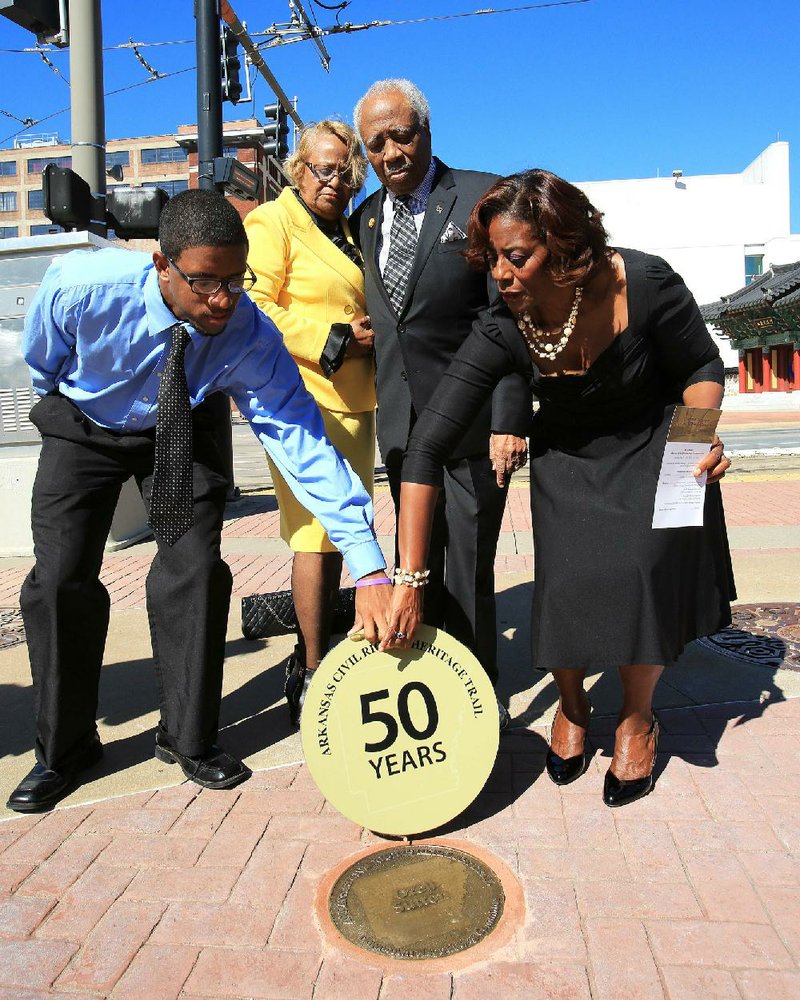Ozell Sutton can still recite the words he sang in harmony with his friends and colleagues as they marched the streets of downtown Little Rock more than 50 years ago.
“Ain’t gonna let anybody turn me around, gonna keep on walkin’, gonna keep on talkin’…”
Sutton and the others were fighting for the desegregation of downtown Little Rock.
That goal was realized in 1963, and Saturday, Sutton was named the 2013 Arkansas Civil Rights Heritage Honoree and was recognized along with 10 others for his role in the desegregation movement. Sutton, a Gould native, was the event’s only living honoree.
The names of all 10 were inscribed on Civil Rights Heritage markers on the sidewalk in front of the Little Rock Regional Chamber of Commerce building at 200 E. Markham St.
The day-long celebration at the chamber also featured those working now to continue Little Rock’s transition to a diversely prosperous city of equal opportunity. The event was co-sponsored by the University of Arkansas at Little Rock Institute on Race and Ethnicity.
Sutton, 87, was part of the civil-rights movement in Little Rock and around the country.
He was in Birmingham, Ala., when the Rev. Martin Luther King Jr. was in jail. Sutton was in Room 308, just down from King’s Room306 at the Lorraine Motel in Memphis, where King was assassinated.
He was arrested. He was beaten in front of Central High School during the crisis in 1957, but he kept going back every day there were protests.
His children eventually graduated from that school.
When he marched in downtown Little Rock, a man put ice down his back. Another spat tobacco at his forehead because he thought Sutton was King.
When he started at the Arkansas Democrat in 1950, Sutton was the first black reporter to work for a white-owned newspaper in Arkansas. He later worked for Winthrop Rockefeller. He also worked for the Arkansas Council on Human Relations, which was involved in desegregation efforts across the state.
He recalled being kicked out of the state Capitol and told he couldn’t eat at the cafeteria there.
“You don’t know what it was like trying to desegregate downtown Little Rock,” he told the crowd of about 100. “You don’t know what it took to get to this occasion,” he added, choking back tears.
UALR Chancellor Joel Anderson said racial issues had not died in the years since the civil-rights movement and that Little Rock was increasing in diversity with its growing Hispanic and international populations.
An afternoon panel addressed how to increase diversity among community and business leaders through mentoring.
Charles Stewart, founder and chairman of the Arkansas Black Hall of Fame, said cities and organizations need to foster growth and success in younger generations to prevent leadership from simply dying off in a community. He said he was an unapologetic beneficiary of affirmative action, which led to his being able to ascend in finance in Little Rock in the 1970s.
Bob East, chairman of the board of directors of construction company East-Harding Inc., helped start a mentoring program years ago to help minority-group contractors become qualified to do work with cities and the state.
“None of them want to be minority contractors,” he said. “They want to be contractors.”
Besides Sutton, the honorees were Dr. Garman Freeman, physician and founding member of the Council on Community Affairs; Dr. Morris Jackson, physician, Philander Smith College graduate and founding member of the Council on Community Affairs; William Starr Mitchell, president of the Little Rock Chamber of Commerce and a member of the Downtown Negotiating Committee; James Penick, president of Worthen Bank and Trust Co. and leader of the Downtown Negotiating Committee; Arthur Phillips, president of M.M. Cohn department store and a member of the Downtown Negotiating Committee; the Rev. Negail Riley, pastor at Philander Smith’s Wesley Chapel Methodist and a member of the Council on Community Affairs; Bert Strauss, Philander Smith graduate who helped lead sit-ins to desegregate lunch counters; Dr. William Townsend, optometrist and a founding member of the Council on Community Affairs; Dr. Evangeline Upshur, dentist and a founding member of the Council on Community Affairs; B. Finley Vinson, president of First National Bank and a member of the Downtown Negotiating Committee.
The Council on Community Affairs was an all-black organization that supported desegregation efforts in the state.
The Downtown Negotiating Committee was a group of businessmen who met with delegates from the black community to negotiate an end to sit-ins at lunch counters in Little Rock, according to the Encyclopedia of Arkansas History & Culture. The committee ultimately agreed to a phased-in program of downtown desegregation.
Arkansas, Pages 15 on 09/22/2013

